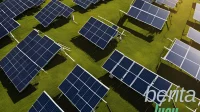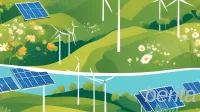The landscape of renewable energy project management is experiencing unprecedented growth in the United States. According to the U.S. Energy Information Administration (EIA), renewable energy projects accounted for over 20% of utility-scale electricity generation in 2023, marking a significant milestone in the nation’s energy transition. As organizations strive to meet ambitious sustainability goals and capitalize on clean energy opportunities, effective project management has become crucial for successful renewable technology implementations. Whether managing solar installations spanning hundreds of acres or coordinating offshore wind projects, these complex initiatives require a unique blend of traditional project management principles and specialized renewable energy expertise.
Introduction to Renewable Technology Project Management
The U.S. renewable energy sector stands at a pivotal moment in its evolution, marking an era of unprecedented growth and transformation. With investments surpassing $100 billion in 2023, the industry has moved far beyond its nascent stages to become a cornerstone of America’s energy future. This remarkable expansion stems from a powerful combination of federal incentives, ambitious corporate sustainability commitments, and significantly reduced technology costs. For project managers in this dynamic field, these developments present both exciting opportunities and complex challenges that demand innovative solutions.
As the industry has matured, the practice of project management in renewable energy has undergone its own remarkable transformation. Traditional energy project management approaches, once focused primarily on conventional power generation, have evolved into sophisticated frameworks tailored to renewable technologies. Today’s renewable project managers must orchestrate a complex symphony of factors that their predecessors never encountered. They navigate intermittent energy generation patterns, tackle intricate grid integration challenges, and implement cutting-edge storage solutions. Moreover, their scope extends beyond technical considerations to encompass comprehensive environmental impact assessments and robust community engagement initiatives, reflecting the industry’s broader commitment to sustainability and social responsibility.
This evolution, however, brings with it a unique set of challenges that distinguish renewable projects from their conventional counterparts. Weather dependency emerges as a critical factor, with seasonal variations significantly impacting construction schedules and project timelines. Project managers must also navigate an intricate web of permitting processes that vary considerably across states and localities, adding layers of complexity to project planning and execution. Supply chain considerations have taken on new urgency, as the availability of specialized components can make or break project timelines.
Furthermore, the technical demands of integrating renewable energy systems with existing grid infrastructure require careful planning and expertise. Perhaps most challenging of all is the industry’s rapid technological evolution – project managers must remain agile and forward-thinking, ready to incorporate emerging innovations while ensuring project stability and success.
The intersection of these market dynamics, industry evolution, and unique challenges creates an environment where skilled project management becomes not just beneficial, but essential for success. As we delve deeper into the key components and strategies of renewable project management, we’ll explore how successful managers navigate these complexities while delivering projects that meet both environmental goals and business objectives.
Key Components of Renewable Project Management
Success in renewable energy projects hinges on a carefully orchestrated combination of planning, risk management, and stakeholder engagement. Understanding these core components is essential for navigating the complex landscape of renewable energy development.
Initial Assessment and Planning
The foundation of any successful renewable energy project lies in its initial planning phase. This critical stage demands a comprehensive approach that goes far beyond simple site selection. Project managers must conduct thorough feasibility studies that consider both immediate requirements and long-term sustainability goals.
Site selection begins with sophisticated resource assessment studies, analyzing factors such as solar irradiance patterns or wind speed data over multiple years. However, the modern project manager must look beyond these basic metrics. Environmental impact studies must be conducted with increasing rigor, considering not just immediate effects but long-term ecological implications. Grid connection feasibility studies require careful coordination with utility companies and regional transmission organizations, while local zoning requirements demand early engagement with municipal authorities.
The financial framework of these projects requires equally careful consideration. Today’s project managers work closely with financial analysts to develop comprehensive models that account for:
- Detailed capital expenditure projections that reflect current market conditions
- Operating cost estimates incorporating maintenance and staffing requirements
- Sophisticated revenue forecasting models that account for energy price variations
- Complex tax incentive analyses that maximize available federal and state benefits
Risk Management
In the renewable energy sector, risk management has evolved into a multifaceted discipline that requires constant attention throughout the project lifecycle. Weather-related risks, once seen as simple construction delays, now demand sophisticated mitigation strategies that can affect everything from equipment selection to contractual obligations.
Modern risk management in renewable projects encompasses:
- Advanced weather monitoring systems that integrate with project scheduling
- Performance guarantee structures that protect both developers and investors
- Comprehensive regulatory compliance frameworks that adapt to changing requirements
- Supply chain risk mitigation strategies that account for global market dynamics
- Technology obsolescence protection through careful equipment selection and warranty programs
Stakeholder Management
Perhaps no aspect of renewable project management has evolved more significantly than stakeholder management. The days of simple bilateral relationships between developers and utilities have given way to complex networks of interested parties, each requiring specific engagement strategies.
Successful stakeholder management now requires:
- Early and continuous community engagement programs that build local support
- Regular coordination with utility companies on technical and operational requirements
- Proactive relationships with environmental groups to address concerns early
- Strategic engagement with government agencies at multiple levels
- Clear communication channels with financial investors and equipment suppliers
Tools and Methodologies
The evolution of renewable energy project management has given rise to sophisticated tools and methodologies that combine traditional project management principles with industry-specific requirements. This integration of technology and process creates a robust framework for project success.
Project Management Software
Today’s renewable energy projects demand specialized digital solutions that go beyond traditional project management tools. Modern project managers leverage a comprehensive suite of software applications that provide real-time insights and predictive capabilities.
Leading organizations typically employ:
- Advanced scheduling platforms like Primavera P6 and Microsoft Project, enhanced with renewable-specific plugins
- Resource optimization tools that account for weather patterns and seasonal variations
- Real-time performance monitoring systems that integrate with IoT sensors
- Cloud-based document management platforms ensuring seamless collaboration across global teams
- Specialized financial modeling software for renewable energy projects
The integration of these tools creates a digital ecosystem that enables:
- Precise tracking of multiple project components
- Real-time adjustments to project timelines
- Automated reporting and compliance documentation
- Enhanced stakeholder communication
- Data-driven decision making
Frameworks and Standards
The renewable energy sector has developed its own set of frameworks and standards that complement traditional project management methodologies. These frameworks reflect the unique requirements of renewable projects while maintaining alignment with established best practices.
Key frameworks include:
- PMI’s Project Management Body of Knowledge (PMBOK), adapted for renewable energy projects
- Agile methodologies modified to accommodate the unique phases of renewable development
- ISO 14001 Environmental Management Standards integration
- IEC Technical Standards specific to different renewable technologies
- Industry-specific safety and quality standards
Documentation and Reporting
Comprehensive documentation serves as the backbone of successful renewable energy projects, providing crucial accountability and transparency throughout the project lifecycle.
Essential documentation includes:
- Detailed environmental impact assessments that meet federal and state requirements
- Comprehensive permit applications aligned with local regulations
- Regular construction progress updates with milestone tracking
- Performance monitoring reports with defined metrics
- Stakeholder communication logs and engagement records
Best Practices and Case Studies
Real-world examples provide valuable insights into successful project implementation strategies and potential pitfalls to avoid. These lessons learned from actual projects help shape future best practices in the industry.
Success Stories
California Solar Farm Implementation
This 100MW utility-scale solar installation in California’s Mojave Desert exemplifies excellence in renewable project management. The project’s success stems from:
- Innovative construction sequencing that reduced timeline by three months
- Strategic procurement strategies resulting in 5% cost savings
- Implementation of advanced safety protocols leading to zero incidents
- Comprehensive community engagement program that built strong local support
- Integration of wildlife protection measures exceeding regulatory requirements
The project team’s proactive approach to challenges included:
- Early engagement with environmental stakeholders
- Advanced weather monitoring systems integration
- Flexible scheduling to accommodate environmental constraints
- Regular community updates and feedback sessions
Texas Wind Farm Development
The 200MW wind installation in West Texas demonstrates the importance of adaptable project management in varying conditions. Key achievements include:
- Pioneer implementation of advanced weather monitoring
- Development of efficient supply chain management systems
- Successful integration of wildlife protection measures
- Creation of significant local economic benefits
Implementation Strategies
The successful execution of renewable energy projects requires a carefully orchestrated approach that balances technical requirements, environmental considerations, and stakeholder expectations. Let’s explore the key strategies that drive successful implementation.
Timeline Management
Effective timeline management in renewable energy projects demands a unique blend of flexibility and precision. Unlike conventional construction projects, renewable energy installations must account for environmental factors while maintaining strict deployment schedules.
Key elements of successful timeline management include:
- Milestone development incorporating seasonal weather patterns
- Buffer periods for environmental and wildlife considerations
- Supply chain coordination with multiple international vendors
- Resource allocation accounting for specialized skill requirements
- Regular progress monitoring with real-time adjustments
Project managers achieve optimal results by:
- Implementing weather-conscious scheduling systems
- Maintaining flexible resource allocation plans
- Establishing clear communication protocols
- Using predictive analytics for timeline optimization
- Creating contingency plans for common delays
Quality Control
Quality assurance in renewable energy projects extends beyond traditional construction metrics to encompass environmental impact and long-term performance considerations.
A comprehensive quality control program includes:
- Rigorous equipment testing protocols meeting international standards
- Detailed installation verification procedures
- Continuous performance monitoring systems
- Preventive maintenance scheduling
- Regular environmental compliance audits
Best practices for quality control involve:
- Third-party verification of critical components
- Regular team training and certification updates
- Documentation of all quality control processes
- Integration of automated monitoring systems
- Periodic review and improvement of procedures
Cost Management
Effective cost management in renewable energy projects requires careful attention to both immediate expenses and long-term financial implications.
Essential components include:
- Detailed cost tracking systems
- Change order management protocols
- Contingency planning for unexpected expenses
- Value engineering opportunities
- Regular financial reporting and analysis
Successful cost management strategies:
- Implement real-time cost tracking systems
- Maintain transparent financial reporting
- Establish clear approval hierarchies
- Create early warning systems for budget variances
- Develop cost optimization strategies
Conclusion
The future of renewable energy project management continues to evolve as technology advances and environmental considerations become increasingly important. Successful project managers must stay ahead of these changes while maintaining focus on fundamental project management principles.
Key takeaways for future success include:
- Embracing technological innovation while maintaining proven practices
- Developing flexible management approaches that adapt to changing conditions
- Building strong stakeholder relationships across all project phases
- Maintaining focus on environmental sustainability
- Investing in continuous learning and professional development
The renewable energy sector presents unique challenges and opportunities for project managers. Success requires:
- Comprehensive understanding of technical requirements
- Strong environmental awareness
- Effective stakeholder management skills
- Adaptable management approaches
- Commitment to continuous improvement
As the industry continues to grow, project managers who combine these elements while staying current with emerging trends will be best positioned for success.
Frequently Asked Questions (FAQ) about Renewable Project Management
What is the project management of renewable energy?
Renewable energy project management is the process of planning, executing, and overseeing renewable energy installations from conception to completion. It involves coordinating various aspects including site selection, resource assessment, permitting, construction, and commissioning while managing stakeholders, budgets, and timelines. Project managers must balance technical requirements with environmental considerations and regulatory compliance.
What skills are needed for renewable energy project management?
Key skills include:
- Technical understanding of renewable energy systems
- Project management methodologies (PMP, Agile, etc.)
- Risk management expertise
- Financial analysis and budgeting
- Stakeholder communication
- Environmental regulations knowledge
- Contract management
- Problem-solving abilities
- Leadership and team management
How long does a typical renewable energy project take?
Project timelines vary significantly based on:
- Type of renewable technology (solar, wind, etc.)
- Project scale (utility-scale vs. commercial)
- Location and permitting requirements
- Grid connection complexity
- Typically: Small-scale solar: 3-6 months, Utility-scale solar: 12-24 months. and Wind farms: 18-36 months
*Note: Timelines can vary based on local regulations and conditions.
What are the biggest challenges in renewable energy project management?
Common challenges include:
- Weather-dependent construction schedules
- Complex permitting processes
- Supply chain uncertainties
- Grid interconnection requirements
- Technology evolution and obsolescence risks
- Environmental compliance
- Stakeholder management
- Financial uncertainty
What is the typical cost range for renewable energy projects?
Costs vary widely based on:
- Project type and size
- Location and site conditions
- Equipment selection
- Labor markets
- Current ranges (2024): Utility-scale solar: $0.8-1.3 million per MW, Onshore wind: $1.3-1.8 million per MW, Commercial solar: $1.5-2.5 per watt
*Note: Costs continue to decrease as technology improves
How do you ensure quality control in renewable energy projects?
Quality control involves:
- Equipment testing and certification
- Installation verification procedures
- Performance monitoring systems
- Regular inspections and audits
- Compliance with industry standards
- Documentation and reporting
- Third-party verification
What software tools are commonly used in renewable energy project management?
Popular tools include:
- Project scheduling: Primavera P6, MS Project
- Resource management: SAP, Oracle
- Performance monitoring: SCADA systems
- Document management: SharePoint, Procore
- Financial modeling: specialized renewable energy software
- Risk management: custom industry solutions
How do you manage stakeholders in renewable energy projects?
Effective stakeholder management includes:
- Early identification of all stakeholders
- Regular communication and updates
- Community engagement programs
- Transparent decision-making processes
- Clear feedback channels
- Issue resolution procedures
- Documentation of all interactions
What certifications are valuable for renewable energy project managers?
Recommended certifications:
- Project Management Professional (PMP)
- NABCEP certifications (solar specific)
- Renewable Energy Professional (REP)
- Environmental Management certifications
- Safety certifications (OSHA)
- Industry-specific technical certifications
How do you measure the success of a renewable energy project?
Key success metrics include:
- On-time completion
- Budget adherence
- Performance metrics achievement
- Safety record
- Environmental compliance
- Stakeholder satisfaction
- Energy production targets
- Return on investment (ROI)





